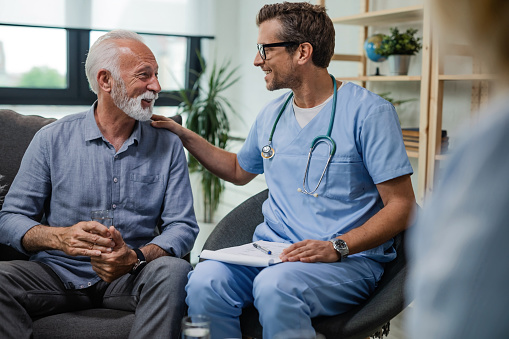Sussex Premier Health, Hastings: Important update for patients with upcoming appointments
Sussex Premier Health, Hastings: Important update for patients with upcoming appointments
Minimally invasive way to treat an enlarged prostate
Using implants, the UroLift® system provides an alternative to drugs or major surgery to treat an enlarged prostate.
It opens up the blocked urethra by lifting the enlarged prostate out of the way without any cutting, heating or removal of the tissue.

If you’ve been suffering from an enlarged prostate or BHP (Benign Prostatic Hyperplasia: a non-cancerous growth of the prostate, which causes it to enlarge and press on the urethra) you’ve probably been experiencing urinary problems, such as:
For some men, the symptoms will be mild, but for others the symptoms can have a detrimental affect on their lives, requiring them to seek treatment.
UroLift® is a new, minimally invasive treatment we offer at Spire to help open up the blocked urethra using inserted implants to lift or hold up the prostate tissue. It does not involve cutting, heating or removing any of the tissue, which can have long term side effects on erectile function and urinary incontinence.
The implants are made from surgical stainless steel, which resists corrosion and allows them to be permanent.
UroLift® doesn’t require an overnight stay and you can typically return to normal daily activities soon after treatment. It’s the only procedure for BHP that preserves sexual functions.
You’ll meet your consultant in one of our private consultation rooms. During this time you will be able to explain your medical history symptoms and raise any concerns that you might have.
We will also discuss with you whether any further diagnostic tests such as scans or blood tests are needed. Any additional costs will be discussed before further tests are carried out.
Depending on the severity of your symptoms we may suggest medication to relax the muscles around the bladder or shrink the prostate. We may also consider TURP (Transurethral Resection of the Prostate) traditional surgery.

On the day of your operation, our ward staff will show you to your own private room. Your private room will have an en-suite bathroom and TV and Wi-Fi facilities.
Once you’re ready, our nurses will help you prepare for your procedure, you will also see your consultant surgeon.
UroLift® is performed under a local anaesthetic or light general anaesthetic. It typically lasts 30-45 minutes.
The urologist uses an endoscope to insert the UroLift® system into the urethra through the tip of the penis. The urologist then places tiny implants to hold the prostate lobes apart like open curtains on a window to relieve compression on the urethra. This allows urine to flow normally again.
Typically four implants are placed in the prostate; two on each side to adequately pull the gland back but this is dependent on the size of the prostate and the location of the enlargement.

The operation is usually carried out as a day-case so you won’t need to stay overnight in hospital and can normally return home the same day without a catheter.
After your procedure you will be taken to your room where you can rest and recuperate until we feel you’re ready to go home.
Patients may experience some urinary discomfort during the recovery period. We’ll give you pain relief while you’re in hospital and when you go home.
We will provide you with a supply of any medicines your consultant feels you need to take home with you after you’ve left hospital, up to 14 days. This may be at an additional cost to some patients.
Patients can return to normal activity as soon as they feel confident to do so and many experience relief from around two weeks post-operation.

Your consultant will talk to you at your consultation about the possible risks and complications of having this procedure and how they apply to you.
On rare occasions, complications following UroLift® can occur. These can include: haematuria, dysuria, micturition urgency, pelvic pain and urge incontinence. If you experience any of related symptoms discussed by with your consultant, please call our nursing team straight away on 01424 757459.
Your consultant surgeon will perform your procedure. You will see them at your initial consultation, on the day of your procedure and possibly in clinic for a follow up appointment.
A guide price for UroLift® prostate surgery is from £5,721.
An initial consultation with a Consultant Urological surgeon is from £200 and does not include the cost of any diagnostic tests, scans or treatment.
To speak to a member of our self pay team today, call 01424 757455.
Speak to a member of our team